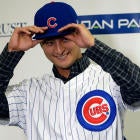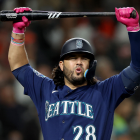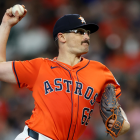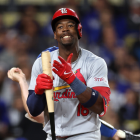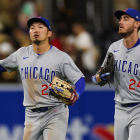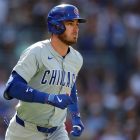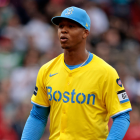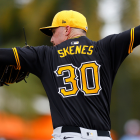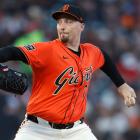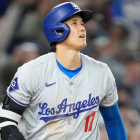The Chicago Cubs struck back in the NL Central arms race, inking Yu Darvish to a six-year contract worth a guaranteed $126 million.
The deal, which could pay Darvish up to $150 million overall, fills a glaring area of need for a team that's made the NLCS three years in a row, with a little something else thrown in for good measure. With Jake Arrieta filing for free agency and John Lackey retiring, Chicago needed starting pitching help, even after nabbing Tyler Chatwood on a somewhat speculative three-year pact.
This is more than just a big-revenue team filling a hole by throwing money at a problem, though. By signing the four-time All-Star, the Cubs perked up what had been a quiet offseason for one of baseball's glamour teams, and a shockingly quiet Hot Stove season for MLB as a whole.
The Cubs taking this long to sign Darvish isn't merely a function of a slow-moving offseason. Few big-ticket free agents of recent vintage have brought this striking a combination of risk, and reward.
When he calls it quits one day, Darvish will go down as one of the greatest prodigies in baseball history. Six-foot-five, strong and athletic, with blazing fastball velocity and a beguiling array of breaking pitches, he was already a superstar at Tohoku High School in Japan. With that stardom came the frightening workloads that managers heap on star pitchers in their quest for the coveted Koshien National High School Baseball Championship. It was Darvish's 2004 no-hitter in that tournament that rocketed interest in the big righty into orbit.
By age 18, Darvish was firing high-leverage innings at the pro level, for the Nippon Ham Fighters. At age 19, he led the Fighters to their first pennant in 25 years, while firing 149 2/3 innings and clocking a 2.89 ERA. That's the great paradox of wunderkind pitchers, of course: The dazzling ability at a young age that makes scouts drool also make doctors and trainers wince at the prospect of rebuilding a damaged arm at some point in the future.
In Darvish's case, that setback didn't crop up until a decade after that magical no-no, with elbow inflammation knocking him out for the stretch run in 2014, followed by Tommy John surgery the following March. Going under the knife didn't slow him down at first, though; on the contrary, Darvish's fastball spiked to career-high levels after his return from surgery.
But after an impressive 17 starts in his 2016 return season, Darvish posted some of the worst numbers of his major league career in 2017, with his ERA spiking to a near career-worst 3.86, in large part due to the career-high 27 homers he surrendered over 31 starts. Still, Darvish remains one of the most prolific strikeout artists in baseball, ranking seventh among MLB starting pitchers in K rate since since his return.
Darvish also suffers from the incurable condition of being a pitcher. While the rate of Tommy John surgeries has dropped somewhat from recently terrifying peak levels, predicting how a pitcher will fare over the next six seasons is a fool's errand of the highest degree. As data-heavy and details-focused as today's front offices are, baseball by and large still doesn't know a damn thing when it comes to predicting long-term pitching performance. Given that Darvish's contract could take him past his 37th birthday in what's increasingly becoming a young man's sport, it's hard not to see the red flags flashing everywhere.
The flip side to all that gloom and doom is there are real rewards to be had here. For starters, the going rate for free agents is approaching $9 million per win, if we use Wins Above Replacement as a baseline. WAR is by no means a perfect measuring tool, and a panoply of other factors can and do affect how much teams pay for talent on the open market. Still, the Cubs have valued Darvish as roughly a 2.5-win player based on the $21 million a year he'll rake in. Yes, his history of big workloads and elbow issues is alarming. He's also going to make less per year than the far, far, far less talented Jordan Zimmerman got back in 2015. That's a happy outcome.
There's also this: The Cubs might not have to keep paying Darvish until he's 37. According to ESPN's Jerry Crasnick, they might not have to pay him for more than two seasons, if Crasnick's report of a potential opt-out clause after two years proves to be accurate.
Most importantly, the Cubs are still rolling out a loaded core led by All-Star corners Kris Bryant and Anthony Rizzo. That core became threatened by the upstart Brewers this offseason, after Milwaukee reeled in two toolsy-as-hell outfielders in Christian Yelich (who the Crew liked enough to trade multiple quality prospects to get) and Lorenzo Cain (who'd been the highest-paid free agent this winter before the Darvish signing).
When the Brewers made an offer to Darvish as a potential coup de grace, the Cubs had good reason to get nervous, and to reach into their war chest. With staff ace Jimmy Nelson possibly out until June and Milwaukee already loading up on talent, expect the club's attention to turn to other free agents such as Lance Lynn or Alex Cobb, with the possibility of an Arrieta signing looming as a delicious way to further stoke what could be an electrifying NL Central race (even if some of the computers don't agree). With Darvish off the board, don't be surprised if this winter's stalemate breaks, and the other significant arms still out there get scooped up in the next few days.
One popular narrative that emerged last fall painted Darvish as an overly sensitive soul who folds under pressure. His ugly outings in Game 3 and Game 7 of the World Series, in which Darvish became just the second pitcher in World Series history to last fewer than two innings in two different starts, turned whispers into horrified screams.
Color me skeptical. Sportswriters love both post-hoc analysis and psychoanalyzing players almost as much as they love Springsteen. Barry Bonds was a flashy jerk of a player who couldn't come through in the clutch ... until he annihilated everything in his path during the Giants' 2002 run to the Fall Classic. Alex Rodriguez was a prima donna stat-padder who saved his home runs for 8-0 games ... until he put the Yankees on his back and led them to their 27th World Series crown in 2009.
Baseball's playoffs whack us with the dreaded one-two punch of misleadingly tiny sample sizes and heightened stakes, which can cause us to lose our minds and push half-baked theories, rather than just accepting the universal truth that sometimes, bad things just happen. Darvish crapped the bed in two straight starts, with the entire baseball world watching ... and also dominated in his two previous 2017 postseason starts, allowing a single run in both his NLDS and NLCS outings last year.
The Cubs have World Series aspirations of their own, and there's a good chance Darvish will get multiple opportunities to prove his mettle in October. The smart money says that this deal will still sink or swim based on how well his oft-used golden arm holds up under the 30-start grind of multiple regular seasons, not the weird randomness that washes over playoff baseball. Yu can bet the house on it.













